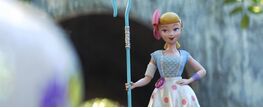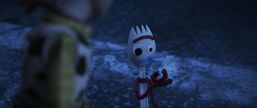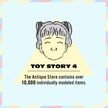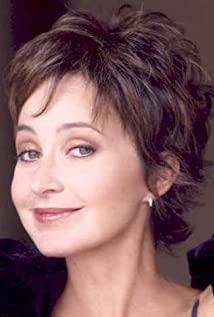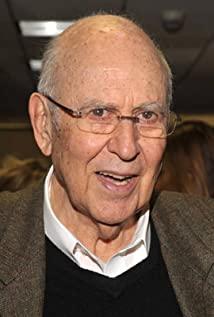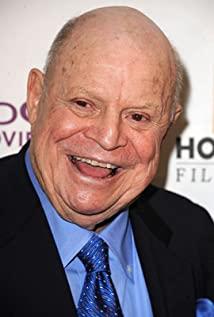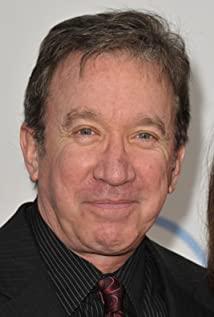"Toy Story 4" also discusses a lot of content, such as abandonment, growing pains, sense of mission, reconciliation with oneself, perfecting opponents, etc... But what I like most is that it focuses on the pen and ink to explore "how should you choose "Your life track" this big proposition.
This is clearly divided into two factions:
The "comfort zone school" represented by (old) toys such as Buzz Lightyear, Tracey, Mr. Potato and Mrs. Potato.
Including the newly added Cha Cha, he is also of this faction.
The so-called "comfort zone school" means that these toys live in a "kid" world. Their world is the world of their children's masters, and there is almost no big danger here. Their mission is to accompany their "kid".
In this movie, all of them, including Buzz Lightyear, also experienced more or less adventures. But the sole purpose of this adventure is to rebuild their "comfort zone" and make their owner Bonnie happy.
This concept is deeply embedded in the first three parts, from Hu Di’s first "kid" Andy to his hand over these toys to another kid Bonnie, we completely accept this setting: each one Cute and perfect toys have a master.
Well, we hardly think about another possibility: what if a toy has no owner?
So in this movie, a new character is introduced—oh no, the old character—Baby Shepherdess.
She has no master, she is a typical "world school".
The role of Baby only appears in the first part. She is a porcelain decoration of a table lamp, wearing a pink dress, and she looks like a good girl. At the beginning of this episode, it tells a story eight years ago. The baby and some other toys were given away.
When Hu Di said goodbye to her, the baby said very understandingly: "It's okay. I'm not Andy's Toy, remember?" Here I am a little misunderstood-she may mean, a) She is sister Andy The toy does not belong to Hu Di’s world, Hu Di does not need to save her; b) She is a lamp decoration, her attribute is not a toy at all!
When Hu Di met her again, she was a female warrior! She went from a cute pink shepherdess who always guarded the table lamp to a resourceful and capable female warrior. There was one scene I particularly liked. She was going to drive (the weasel toy) and set off, and then pulled the big pink skirt, underneath was a pair of neat pants with a cloak, the shepherd's stick and her sheep became hers Weapons, my God, I'm so excited! ! !
So what's the matter with her? She believes that not all toys must have an owner. After she left Andy's house, she has been on the beach of a playground. When the children came, she played with them. The children left her own world.
Moreover, she forged a talent. Compared to the adventures she experienced, the little adventure of the "comfort zone pie" is nothing short of a small case: there was a scene when they went to rescue the fork together, and she accidentally broke her hand. Hu Di screamed in fright. She calmly took the double-sided tape and glued it, and said to comfort Hu Di: "Don't worry! It happens all the time!"
Standing on the top of the carousel shed in the playground, she said, "With all this, who wants a kid's world?"
The new characters introduced have different understandings of these two factions.
The new baby Gaby has never had a kid, and she doesn't enjoy the kind of life without a kid in an antique shop/amusement park. She just wants a kid to bring her warmth. She just wanted to return to the "comfort zone" that everyone has.
Yaya and Tutu were originally toys that were won in the amusement park. They originally wanted to be hit by kid and win home to accompany kid, but they never realized it. After experiencing the adventure, they and the baby firmly became the "world faction".
The protagonist Hu Di took the initiative to jump into the larger world from the "comfort zone". At first, when he was at Bonnie's house, he obviously felt that he was ignored, but he still tried to hypnotize himself: "Bonnie needs me, I must stay here with her."
In the end, after experiencing adventures, he still chose to leave Bonnie to see the world with her baby.
So, this enlightenment to us is: When you find that your life is not as good as you want, and there are some steps you want to take, but you are not sure, at this time, don't hesitate to step forward. There may be pains, but believe in yourself, and your life will be wonderful afterwards.
At the end of the film, I gave a lot of shots to tell about the adventures of Hu Di, Baby, Yaya and Tutu in the playground, which is very interesting.
There is another dimension.
I have met many people who come from small cities. After living in Shanghai, Hong Kong, London, New York and Paris for many years, they feel that they have seen the world and feel that they should be more "advanced" than those who live comfortably in small cities. There is a sense of superiority between talking and gestures.
I have to say that Pixar has done a very good job on this point. The whole film does not compare these two kinds of life, and does not criticize which life is good and which is bad.
Whether it is a toy that is so brave, trying to see the world, or a toy that is guarded in the little master's bedroom, life revolves around kid, the film has given full affirmation.
So, do we need to be affirmed like this in our dissatisfied life? Is there a little self-hypnosis?
Don't forget, Hu Di is the one who writes the most in the movie, and after the adventure, Hu Di's transformation.
Here is the answer: when Hu Di and the baby quarreled, they used the word "lost".
Hu Di said that the baby is a lost toy. Lost here means that she was abandoned by the owner.
Baby let Hu Di think about it, is he lost? Lost here means whether his heart is lost.
Whether you stay in your comfort zone or become a citizen of the world, you have to figure out a question: What do you desire in your heart?
If your heart tells you that this place is not suitable for you, then don’t hesitate; for the same reason, when you feel lonely and lonely, and need a comforting home to warm you up, then you can always be courageous anytime, anywhere. return.
As long as you are loyal to your heart, listen to your inner voice, and be brave, then whatever choice you make is correct.
View more about Toy Story 4 reviews




